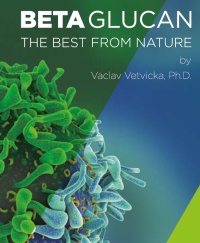
Our body is the venue of a constant battle in which our defensive system, led by macrophages and other cells, fights against omnipresent bacteria. If our immune system is weakened for any reason, clearly our body will start losing. An optimum immune system will easily recognize a foreign substance, no matter if it is a bacterium or a parasite, and destroy it. Macrophages, present in all bodily organs, act as army generals, sending white blood cells to the battle. In fact, they work a bit like the famous Pac Man in the favourite video game of our youth. However, they cannot deal with everything and long-term infections or recurrent diseases will exhaust them just like the whole organism. In addition, since the resistance of bacteria against antibiotics is growing, the risk of exhaustion is ever growing. Obviously, we have to help our macrophages, which constitute the most essential line of defence.
Our defensive system is among the most efficient systems of the human body. We have to realize that we don't live in a sterile bubble, but instead in an environment packed with microorganisms, bacteria, viruses and parasites. We cannot avoid them because with every touch or breath, our body is invaded by millions of potentially dangerous enemies. Our protective barriers, i.e. our skin or mucosal epithelium, are usually able to cope, yet too many enemies enter our body.
That is why in the course of millions of years, our body has developed an immune system whose most advanced version can be seen in mammals, including man. Under normal circumstances, this immune system can cope with the never-ending attack. Many of its participants, especially macrophages, which constantly circulate through our body and are present virtually in every organ, recognize and destroy these "aliens". In addition to their own experience, they also draw on the assistance of miscellaneous substances (their own products or products of other cells, cytokines.
And this is where Beta-Glucan can be used ideally.
Beta-Glucan is a unique natural complex polysaccharide, capable of supporting the organism's defensive response against bacterial and parasitic diseases. Even though the biological effects of glucan have been known for quite a long time, scientists have been studying the substance in detail only since mid-20th century. And it's been worth the efforts. Over fifty years of research and thousands of studies, conducted among others by universities in Harvard, Baylor, Tulane and Kentucky, have shown that daily consumption of Beta-Glucan has an optimum stimulating effect on macrophages, which results in a fine-tuned, maximized strength of the defensive system.
The immunomodulating effects of glucans have been tested on a variety of laboratory and other animals, for example fish, shrimps, chickens, mice, rabbits, rats, guinea pigs, sheep, pigs, cows and horses. The immunostimulating effects of glucans are among the most universal biological effects in the whole animal kingdom and so far we have not identified a single biological species without glucan, which underpins the generally positive functions of Beta-Glucans because this biological activity is a general biological defensive phenomenon. In addition, no biological species tested so far has exhibited any long-term adverse reactions after the application of glucan.
Beta-Glucan has other effects, too. Today, it is virtually impossible to avoid a slight degree of radiation, no matter if generated by frequent travels by plane, reflection from computer screens, mobile phones pressed against the ear or X-ray at a doctor. Beta-Glucan activates macrophages to eliminate cells damaged by radiation and acts as an antioxidant. Numerous studies conducted throughout the world, from the United States to Russia and the Czech Republic, have repeatedly demonstrated that the use of glucan in prophylaxis as well as after radiation results in a major support for blood formation. The cell count gets back to normal in the bone marrow first, and then the standard number of immune cells is also recovered in other lymphoid organs, such as spleen or thymus.
Other well-established effects of Beta-Glucan include reduction of the blood cholesterol level and maintenance of an optimum blood sugar level. However, most attention has been recently paid to clinical trials on humans. An extensive series of clinical trials has pointed out the healing effects of glucan in patients after surgeries, where glucan significantly reduced the risk of death due to sepsis. These studies have also identified optimum doses and demonstrated the safety of long-term glucan application in patients after major surgeries on the chest and abdomen. While no negative interactions with other used drugs were observed, the patients treated with glucan experienced significantly fewer infections. Studies conducted in Japan and China have also demonstrated a significantly longer survival time in patients with tumours in case of concurrent application of glucan and chemotherapy. Other studies over the last three years, conducted in three university centres in the USA and in the Philippines, have focused on the effects of Beta-Glucan on the support of specific antibodies against tumour cells. Preliminary studies have shown that the addition of glucan increases the activity of these antibodies up to three times.
There are therefore more than enough reasons for us to start using Beta-Glucan.

The author of the texts is
Prof. Dr. Václav Větvička, Ph.D.
world's leading expert on glucans, Univerzita v Louisville, Kentucky, USA

A book about the mechanism of action and therapeutic use of beta glucanswhich is intended for professionals and for lay readers.
Beta-Glucans | History | Description | Sources | Effects | Use | Experience | Research | Studies | Contact
© 2025 Betaglukan.eu, created by Xone CZ